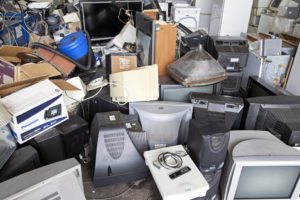
“I would hate to go back to the old system where you just trust somebody who says, ‘Don’t worry, I’ll do good stuff with it,'” said Willie Cade, the president of R2-certified PC Rebuilders and Recyclers. “Can I absolutely trust that one of my certified downstreams is doing the right things? No, but it’s a whole lot better than the alternative.”
Cade’s comments came shortly after the Basel Action Network (BAN) released a report detailing a tracking project that found about a third of 200 low-value electronic devices dropped off for recycling were eventually exported.
Earlier, BAN had released a report noting its tracking project uncovered export activity by Total Reclaim, a longtime backer of the e-Stewards certification BAN founded. The Total Reclaim action was a violation of e-Stewards policy and led to the suspension of the processor’s certification.
SERI, the group that administers the R2 standard, issued a response to BAN’s findings and noted in the statement that R2-certified companies had been implicated in the BAN project.
‘Creates a bit of fear’
While the industry has been wary to use the small sample size as evidence of widespread exports, e-scrap executives at certified processors stressed the work sheds light on how much room for improvement there is when it comes to materials handling.
“I think this is finally what BAN should be doing, which is going back to their roots of environmental advocacy and being a watchdog organization that creates a bit of a fear and concern in the industry that you may watched and that hopefully will make people think twice about cutting corners,” said Neil Peters-Michaud, the president of e-Stewards-certified Cascade Asset Management.
Miles Harter, the CEO of R2-certified Dynamic Recycling, said he believes the research will help weed out bad actors in the industry.
“Lots of people disagree on lots of things, but you have to give BAN credit for flushing some companies out of the network,” Harter said.
He also stressed that certifications “are making a difference” and help highlight the companies that are “doing the right thing.”
“It’s a tall process to get certified and a lot of people can’t adhere to it,” Harter said, “so there’s no doubt that certified companies follow higher standards than non-certified companies.”
Chance to capitalize?
Rick Dumas, the CEO of R2-certified eWaste Recycling Solutions, said he believes more needs to be done to communicate the importance of certification to customers.
BAN’s report received mainstream media attention, including a prime-time special that aired nationally on PBS. Dumas said certified companies should be able to separate themselves from the competition when such news hits the ears of consumers.
“BAN is going to do what BAN is going to do, but when PBS follows up on it, we’re not there as an industry to capitalize on that and be able to do something with our clients where we say, ‘This is why certification is important,'” Dumas said.
He thinks SERI should bring members together this year to discuss how to market the certification to current and potential clients looking for reliable partners. “If you fully embrace these things, it really is a great business model,” Dumas said.
In its statement following the BAN report, SERI noted the challenges that come with trying to ensure that all certified firms follow the rules in terms of material movement. The organization said its efforts thus far have focused on implementing unannounced facility audits that involve inspection of documentation for outbound shipments.
The group also said it is considering a tracking program using RFID technology.
“We are not naïve,” John Lingelbach, SERI executive director, stated. “We have identified and taken action against certified recyclers that are not meeting R2’s requirements. As a result, in the last six months 11 recyclers have been suspended or withdrawn from the program. And our quality program is continuing to evolve in significant, positive ways.”
Harter from Dynamic said he thinks a broader tracking project could include companies that voluntarily sign up to be monitored. “It would be nice if an independent party could step up. We would always support that,” Harter said.